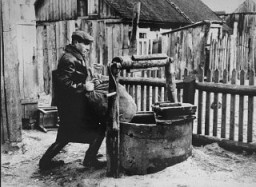You searched for: 德州谷歌推广流程【TG飞机:@bapingseo】脸书全球广告投放【TG电报:@bapingseo】伊朗google搜索推廣【Telegram:@bapingseo】ag真人怎么玩澳j门银河?5zOe2S/f1Hxzk.html
<< Previous | Displaying results 511-520 of 599 for "德州谷歌推广流程【TG飞机:@bapingseo】脸书全球广告投放【TG电报:@bapingseo】伊朗google搜索推廣【Telegram:@bapingseo】ag真人怎么玩澳j门银河?5zOe2S/f1Hxzk.html" | Next >>
-
Thomas Buergenthal describes international tribunals
Oral HistoryJudge Thomas Buergenthal was one of the youngest survivors of the Auschwitz and Sachsenhausen concentration camps. He immigrated to the United States at the age of 17. Judge Buergenthal devoted his life to international and human rights law. He served as chairman of the United States Holocaust Memorial Museum’s Committee on Conscience; was named the Lobingier Professor of Comparative Law and Jurisprudence at the George Washington University Law School; and served for a decade as the American judge at…
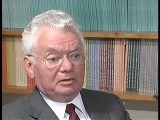
-
Thomas Buergenthal reflects on the importance of memorials
Oral HistoryJudge Thomas Buergenthal was one of the youngest survivors of the Auschwitz and Sachsenhausen concentration camps. He immigrated to the United States at the age of 17. Judge Buergenthal devoted his life to international and human rights law. He served as chairman of the United States Holocaust Memorial Museum’s Committee on Conscience; was named the Lobingier Professor of Comparative Law and Jurisprudence at the George Washington University Law School; and served for a decade as the American judge at…
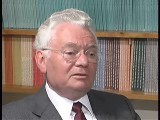
-
John Dolibois describes Justice Jackson's explanation of the purpose of the International Military Tribunal at Nuremberg
Oral HistoryJohn Dolibois immigrated to the United States in 1931 at the age of 13. After graduating from college, Dolibois joined the 16th Armored Division of the US Army. Due to his German language skills, he became involved in military intelligence. He returned to Europe in this capacity toward the end of World War II. Dolibois interrogated German prisoners of war, including leading Nazis, in preparation for the postwar trials of war criminals. He was later appointed US ambassador to Luxembourg, his birthplace.
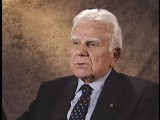
-
John Dolibois describes interrogating German prisoners in preparation for postwar trials
Oral HistoryJohn Dolibois immigrated to the United States in 1931 at the age of 13. After graduating from college, Dolibois joined the 16th Armored Division of the US Army. Due to his German language skills, he became involved in military intelligence. He returned to Europe in this capacity toward the end of World War II. Dolibois interrogated German prisoners of war, including leading Nazis, in preparation for the postwar trials of war criminals. He was later appointed US ambassador to Luxembourg, his birthplace.
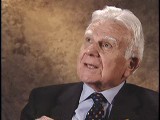
-
John Dolibois describes translating for a prison psychiatrist
Oral HistoryJohn Dolibois immigrated to the United States in 1931 at the age of 13. After graduating from college, Dolibois joined the 16th Armored Division of the US Army. Due to his German language skills, he became involved in military intelligence. He returned to Europe in this capacity toward the end of World War II. Dolibois interrogated German prisoners of war, including leading Nazis, in preparation for the postwar trials of war criminals. He was later appointed US ambassador to Luxembourg, his birthplace.

-
Sam Spiegel reflects on survival during the Holocaust
Oral HistoryIn 1942, Sam was forced into a ghetto in his hometown and assigned to work in a munitions factory. In 1944 he was transported to Auschwitz and then forced to work in a train factory. He survived eight days on a death march after the evacuation of Auschwitz by the Nazis. He was liberated by Soviet units in January 1945. He lived in a displaced persons camp in Germany where worked for the United Nations Relief and Rehabilitation Administration. In 1947, he immigrated to the United States.
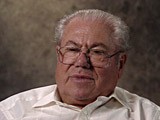
-
Leon Bass describes his wartime experiences
Oral HistoryLeon Bass was born in Philadelphia, PA in 1925. He joined the US Army in 1943 and served as a member of the all-Black 183rd Engineer Combat Battalion attached to General Patton's Third Army. Leon's unit was involved in the Battle of the Bulge as well as the liberation of Buchenwald. After the war, Leon went on to receive his doctorate, teach, and speak about the Holocaust and racism. In this interview, Leon describes his first experiences with the realities of war and death. He reflects upon his…
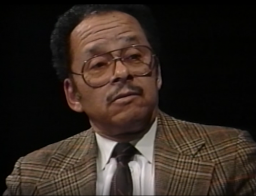
-
Fritzie Weiss Fritzshall describes restrictions placed on Jews in Klucarky
Oral HistoryFritzie's father immigrated to the United States, but by the time he could bring his family over, war had begun and Fritzie's mother feared attacks on transatlantic shipping. Fritzie, her mother, and two brothers were eventually sent to Auschwitz. Her mother and brothers died. Fritzie survived by pretending to be older than her age and thus a stronger worker. On a death march from Auschwitz, Fritzie ran into a forest, where she was later liberated.
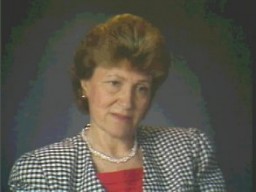
-
Immediate American Responses to the Nazi Book Burnings
ArticleThe Nazi book burnings of 1933 sparked responses from anti-Fascist organizations, Jewish groups, and writers in the United States. Learn more.
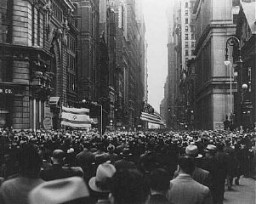
-
Resistance in the Smaller Ghettos of Eastern Europe
ArticleLearn more about Jewish resistance efforts in the smaller ghettos of eastern Europe and the obstacles and limitations Jews faced.
